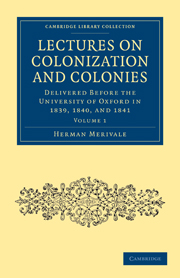 Lectures on Colonization and Colonies
Lectures on Colonization and Colonies Summary
The portion of my subject to which I am anxious next to call your attention relates to the effects produced by colonization, and by the maintenance of colonies and intercourse with them, on the wealth of the mother country. It is not, perhaps, a topic of so much general interest as those of which we have treated on a former occasion, or as those to which we shall at a future time direct ourselves, when the developement of colonies themselves is brought in its turn under our view. The fortunes of the new shoot, when separated from its parent stem, afford a more pleasing object of contemplation than the slight changes which may be produced in the condition of the old familiar tree. The mere effort of directing the mind to travel abroad to those new regions of romance and expectation, where all is life, and hope, and active energy, affords a relief to the spirits, which again feel wearied and fettered when it is called back to fix its attention at home. This yearning after the distant and the unseen is a common propensity of our nature; and how much is the force of that “secret impulse” cherished and strengthened, in the minds of us Englishmen, by all the associations in the midst of which we are educated? Masters of every sea, and colonists of every shore, there is scarcely a nook which our industry has not rendered accessible, scarcely a region to which the eye can wander in the map, in which we have not some object of national interest—some factory for our trade, some settlement of our citizens.
- Type
- Chapter
- Information
- Lectures on Colonization and ColoniesDelivered before the University of Oxford in 1839, 1840, and 1841, pp. 133 - 161Publisher: Cambridge University PressPrint publication year: 2010First published in: 1841
